Internet Sales Tumble By Half In Iran By Government Disrupting Access
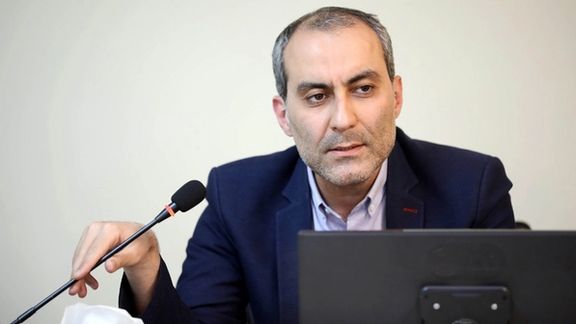
Almost half of the Internet service providers in Iran have seen a 50% drop in sales due to disruptions, censorship, and Internet shutdowns by the government during protests.

Almost half of the Internet service providers in Iran have seen a 50% drop in sales due to disruptions, censorship, and Internet shutdowns by the government during protests.
The computer trade union of Tehran -- or Tehran ICT Guild Organization -- announced Saturday that based on a survey conducted at 104 member companies, almost half of the ISP firms have faced a 50% drop.
The union's secretary Alireza Keshavarz Jamshidian went on to say that about half of the Internet providers lost over 500 million rials (around $1,400) a day, as sales dropped. However, he added, one-fifth of the companies say they suffered between $2,800 and $14,000 loss a day.
“We may not have complete internet outages these days, but restrictions are created through censorship. For example, WhatsApp and Instagram messengers are banned, inflicting damages on people who had a home business on these platforms,” stressed Keshavarz.
Since the beginning of the protests triggered by the death of Mahsa Amini in the custody of the morality police, severe restrictions have been placed on the Internet for more than 50 days.
International internet monitoring groups, including NetBlocks, have repeatedly reported that the flow of data in different cities of the country has reached “a quarter” of its normal.
Regime officials restricted access to the internet to limit the free circulation of information and the posting of videos on social media platforms.
Earlier, the E-Commerce Association in Tehran announced the internet shutdown costs Iran $1.5 million per hour.
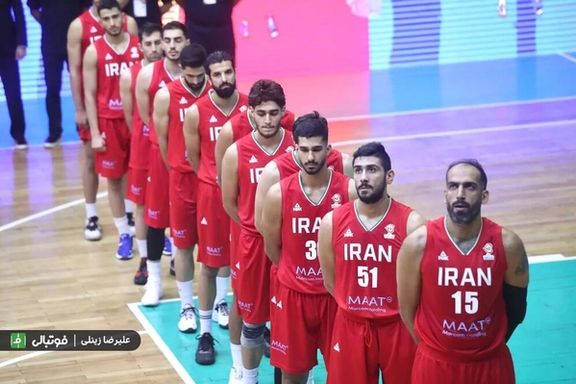
While Iran’s football team is about to embark on its World Cup journey in Qatar, the Islamic Republic is worried that the event serves as an opportunity for antigovernment protests.
Since the current wave of demonstrations began in mid-September, following the death in custody of a young woman, more and more athletes have expressed solidarity with the people either in bold public statements or through different forms of disobedience, such as not singing the Islamic Republic’s national anthem during matches.
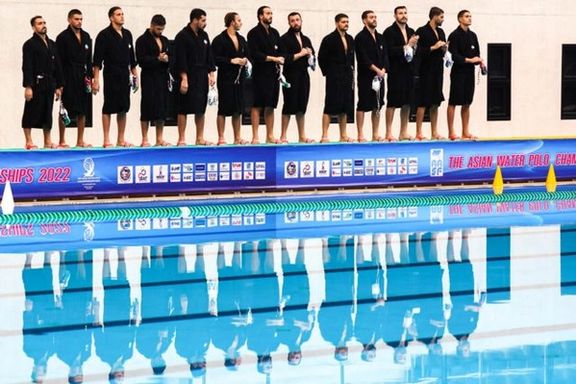
In less than a month, the pace of the athletes showing support for the protests has accelerated as the Iranian football, beach football, waterpolo, basketball, and sitting volleyball teams refused to sing along with the anthem, which is customary in almost all international competitions. Now with the biggest sporting event on the horizon, the regime is resorting to whatever it can to stifle the voices of dissent.
Authorities have made serious threats against athletes and other celebrities to stop them from public displays of solidarity with protesters but to no avail.
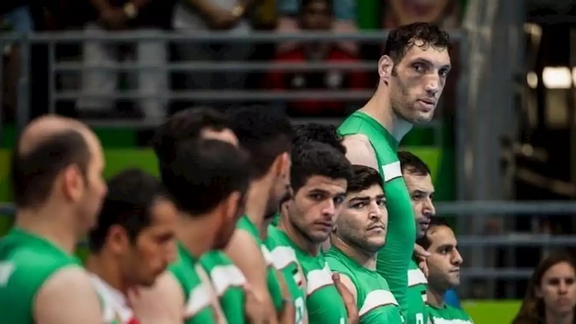
Threatening to remove players from the national squad, Ahmad Rastineh, the spokesman of the parliament’s cultural committee, said on Sunday that "if a player does not have a proper understanding” of the current affairs, it is not necessary to keep them in the national outfit.
Earlier in the month, the beach football federation of the Islamic Republic threatened the players of the national squad for their acts of solidarity with the antigovernment protests.
The national team players did not cheer or celebrate after winning the cup following their final victory against Brazil and also refused to sing the national anthem of the Islamic Republic at the beginning of their semifinal match against the UAE.
During the final, Iranian striker Saeed Piramoun expressed his solidarity with Iranian protesters by miming the hair cutting gesture after scoring a goal. The gesture has become an international symbol of solidarity with Iranian women and the protest movement with many international athletes and celebrities posting images of themselves re-enacting the move. Islamic Republic officials also issued a threatening message to the United Arab Emirates that hosted the Beach Soccer Intercontinental Cup.
A new trending act of solidarity that is catching on in the past several days, is the reenactment of a photo of one the protesters killed by security forces in the Baluch-majority province of Sistan and Baluchestan.
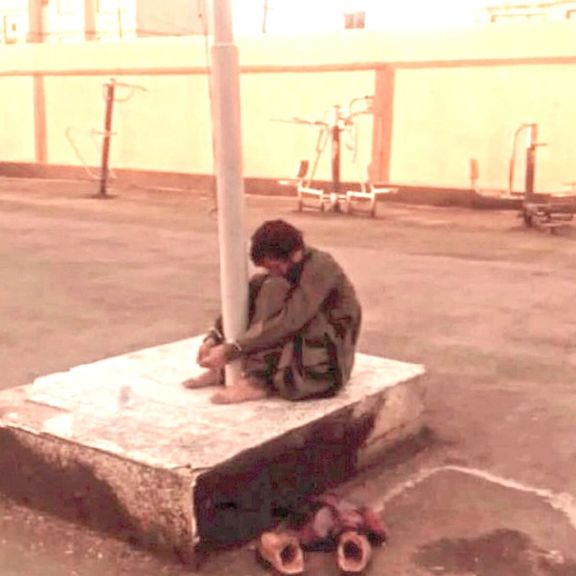
The iconic photo, which is from an earlier event, shows Khodayar Lojei handcuffed to a post while a glass of water is placed near him but with a distance he cannot reach. Several football and futsal players sat in the same position instead of cheering after scoring a goal while another player put a symbolic glass of water near them.
Also on Sunday, Andrea Stramaccioni, the former Italian coach of the popular football club Esteqlal, said in an Instagram story that he was approached by many Iranian state TV sport programs to appear in their shows as a guest during the World Cup, noting that he rejected the offers because the state broadcaster is suppressing the voice of people.
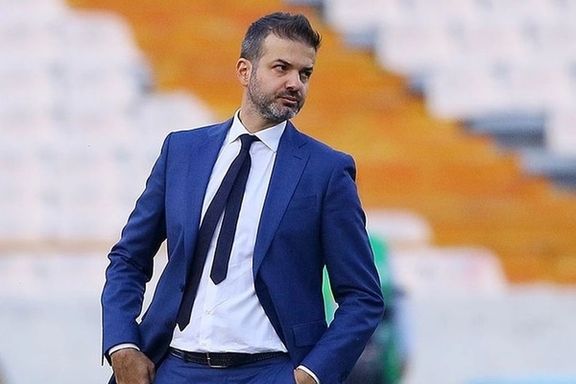
Addressing the Iranians, he said, “My heart is with you and refusing participation in programs and television you don’t approve of is the least I can do to support your brave movement. Do not lose your hope because the Iranian people we saw deserve a lot more than what they already have.”
During a press conference after the Iranian basketball team’s match with the Chinese squad, several journalists walked out as a show of solidarity with their peers arrested for reporting on Islamic Republic’s deadly violence against protesters.
"Our colleagues have been arrested for some time and are now in prison. We cannot [continue our work] until they are released... We have decided to leave this place. We are not spies or criminals. We are journalists. We are only journalists; sport journalists," said one of the reporters before leaving the room.

A quarter of Iran’s farmers have lost their jobs in the past seven years mostly due to lack of water, a local media outlet reported Sunday.
Farhikhtegan newspaper quoted a report by the Statistical Center of Iran saying that between 2015 and 2022, the number of people employed in the agricultural sector shrank by 1.3 million, from 5.1 million to almost 3.7.
Iran has faced drought for most the past two decades, partly due to climate change, but the government has also grossly mismanaged water resources with failing to control inefficient use of underground resources and diverting water for industries.
Based on the report, unemployment for farmers has increased the migration rate from villages to the outskirts of cities causing the expansion of slum-dwellings.
While the oil-rich Khuzestan province in the south was also one of the most fertile provinces of Iran for food production, now it has the highest number of slum-dwellers in the country.
Based on estimates, roughly 14 million Iranians live in slums and Khuzestan ranks first with 1.75 million slum dwellings.
In the summer of 2021, citizens protested the water crisis in 11 cities in Khuzestan.
Farmers in the provinces of Esfahan and Chaharmahal and Bakhtiari held similar rallies to protest “draught, lack of water, and the loss of livestock” but the regime’s security forces used violence to end the protests.
Farhikhtegan quoted city officials as saying that “the increase in population on the outskirts of cities has caused an imbalance in urban development leading to a surge in crime rate.”
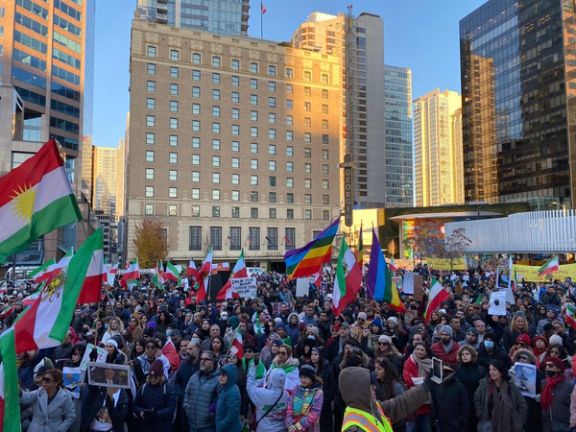
Diaspora Iranians in Europe, North America and elsewhere held rallies Saturday to condemn the Islamic Republic for brutality against antigovernment protesters.
In Canada thousands of expatriates and activists chanted “Woman, Life, Freedom" during their demonstrations in Toronto and Vancouver.
Meanwhile, a group of solicitors in Canada, in collaboration with lawyers in Iran and the United States, launched a campaign to take steps against those Iranian immigrants in Canada who are affiliated with the Islamic Republic.
In Germany, four assailants, including two hijab-wearing women, attacked female protesters in Berlin, reportedly threatening them with knives. Witnesses have told Iran International that one of the attackers spoke Farsi.
The German police arrested the attackers saying their identity and nationality will be announced later.
Protesters also gathered in Berlin city center to slam the killing of citizens in Iran’s southeastern Sistan and Balochestan province.
Activists and Iranians living in London held a protest rally in front of the Embassy of the Islamic Republic of Iran and marched towards the British Parliament. Demonstrators chanted slogans against Iran’s clerical rulers and asked the British government and parliament to increase pressure against the Iranian government.
Similar demonstrations were also held in the United States, Italy, Australia, Sweden, Bulgaria, Denmark, Switzerland, and Italy.
Iranian security forces have killed at least 326 people including 43 children and 25 women during the ongoing protests.
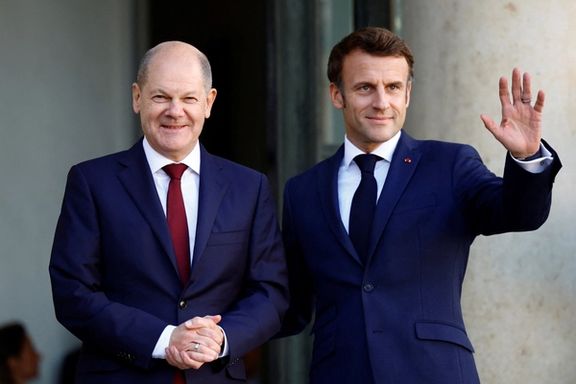
Iran reacted Sunday to the meeting of the French President with a group of Iranian activists saying the statements by Emmanuel Macron were “shameful”.
Foreign Ministry Spokesman Naser Kanani condemned the talks between Masih Alinejad and the French President saying it is surprising that Macron “lowers his level to hold meeting with a hated person who has clearly tried to spread violence and terrorist acts in the Islamic Republic and against its diplomatic missions abroad.”
French President Emmanuel Macron met a group of Iranian female activists in Paris Friday calling the protests in Iran a “revolution”.
US-based activist Masih Alinejad has for years led a campaign encouraging Iranian women to remove their obligatory headscarves.
However, the Iranian spokesman said, “this meeting is a violation of France's international responsibilities in the fight against terrorism and violence.”
This comes as the Islamic Republic is now under great international pressure for its use of violence against its own people during anti-government protests following the death of Mahsa Amini in police custody in September.
At the same time, Kanaani also called the German Chancellor's recent stance on Iran’s violations of human rights “interventionist, provocative and undiplomatic”.
In a video posted on his twitter account Saturday, Olaf Scholz slammed the Iranian regime for use of violence against protesters and called for a new round of EU sanctions on the Islamic Republic next week.
At least 326 people including 43 children and 25 women have been killed by Iranian regime in the ongoing nationwide protests.
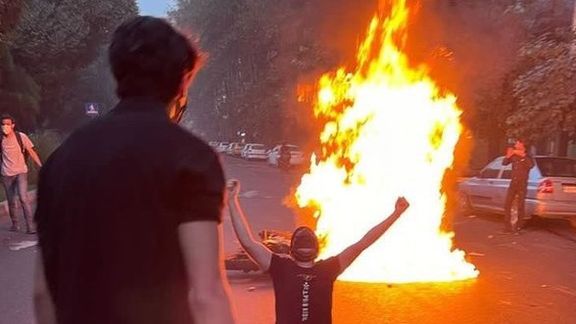
Iranian academic Hadi Khaniki says the current wave of protests in Iran may have originated from the younger generation's feeling of being marginalized.
What the academic is referring to is the dual lack of social freedoms and economic opportunity in a country rich with natural resources but hampered by religious ideology and an inefficient, centralized economy.
Khaniki told Etemad Online in Tehran that he still does not know any way out of the crisis other than holding dialogues. His statement is obviously mindless of the fact that it takes two to tango and that there will be no dialogue while the regime remains unaccountable and exhibits signs of arrogance.
Khaniki said that during recent years the Iranian society has become more pluralistic, but the government continues to believe in controlling and restricting the society's lifestyle and political choices.
He said Iran's new generation is fighting the government to put an end to discriminations against young Iranians. Although networking and voicing demands through social networks exist in all societies, the Iranian government behaves badly by ignoring the young generation’s demands, in an environment where most social, economic and political activities is controlled by the state.
Meanwhile, Khaniki pointed out that the continuation of the discriminatory distribution of privileges in the interest of the older generation has escalated the protests in Iran. He added that the Iranian government ignores the fact that responding to demands is part of its responsibilities.
As the protests in Iran entered its third month, another Iranian reformist commentator, Mohammad Reza Tajik suggested in a commentary published by Etemad newspaper that government officials should avoid making annoying comments that will further enrage young protesters.
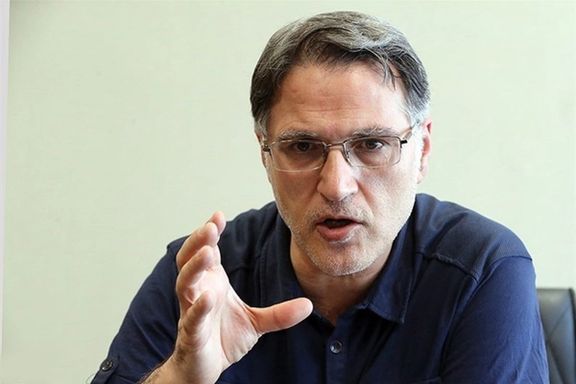
Tajik characterized Iranian officials' rhetoric as outdated and rotten, and their tone as aggressive, violent and rude. "They say no to all the criticisms and demands for change. But this is a language that cannot go any further, hinders communication and remains futile," he said.
Such a rigid rhetoric, said Tajik, puts an end to human bonds and particularly alienates the younger generation. It bruises young Iranians' soul and comes across as bad lies and deceit.
He pointed out that "purifying the political language will purify political action. But this should take place constantly as political rhetoric needs to be consistent with the requirements of modern times. Iranians' political language should be rejuvenated in the same way that Romans did away with the roughness of Latin and turned to a rich language that was suitable for writing laws."
Tajik further opined that healthy politics can be preserved only when politicians do away with rude, vulgar, and violent language. He said politicians should not think that whatever they say is true and comes from God. Instead, they should put their ideas to the test of the people's vote.
He pointed out that under the current circumstances when society is agitated unfair comments will add to its anger and hatred. Thus, it is wise for the country's officials to at least remain silent not to enrage the people even more.
Tajik did not name anyone, but he was obviously talking about hardliner politicians and military commanders considered to enjoy the confidence of Supreme Leader Ali Khamenei.
His representative to Khorasan Province Ahmad Alamolhoda and the editor of Khamenei's office's newspaper Kayhan, Hossein Shariatmadari, on a daily basis pump waves of hate speak into society. Some Revolutionary Guard commanders keep humiliating Iranian protesters by calling them "flies" a species inferior even to "goats," a nickname Alamolhoda gave to Iranians who protested against a rigged election in 2009 and an unusual fuel price rise in 2019.